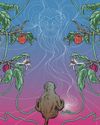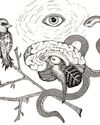
The internet has become so all-pervading that even the word seems a little old-fashioned now. No-one really uses it much anymore. We ask each other for wifi, or talk of going online, or complain about a lack of data, but rarely do we talk of ‘the internet’ as an entity; it has become too ubiquitous, too intrinsic to our lives, for that to be a very useful term. This prompts me to wonder: what are we becoming? Could the internet lead us to become more than individuals and disparate communities?
I believe we’re entering an era when the words ‘individual’ and ‘community’ take on new definitions or meanings as we increasingly become interconnected in what I think of as a ‘hive mind’. I also believe that a hive-minded process could itself be a transition towards a singularity in consciousness across the Earth. Is that desirable, or even possible? Are we in the process of creating it? Is it inevitable? Can it be controlled? What does it even mean?
Before addressing these questions, however, we’ll need definitions of the words ‘Hive’ and ‘Mind’ and the phrase ‘Hive Mind’. What is a ‘hive mind’, exactly?
Mind
An awareness of existence with experiential content, referring both to what is outside itself and to its own existence.
Hive
Multiple entities sharing an element of awareness not unique to any individual but present to each, and experienced by all as some awareness of their collective existence.
Hive Mind
Esta historia es de la edición August/September 2020 de Philosophy Now.
Comience su prueba gratuita de Magzter GOLD de 7 días para acceder a miles de historias premium seleccionadas y a más de 9,000 revistas y periódicos.
Ya eres suscriptor ? Conectar
Esta historia es de la edición August/September 2020 de Philosophy Now.
Comience su prueba gratuita de Magzter GOLD de 7 días para acceder a miles de historias premium seleccionadas y a más de 9,000 revistas y periódicos.
Ya eres suscriptor? Conectar

Anselm (1033-1109)
Martin Jenkins recalls the being of the creator of the ontological argument.

Is Brillo Box an Illustration?
Thomas E. Wartenberg uses Warhol's work to illustrate his theory of illustration.

Why is Freedom So Important To Us?
John Shand explains why free will is basic to humanity.

The Funnel of Righteousness
Peter Worley tells us how to be right, righter, rightest.

We're as Smart as the Universe Gets
James Miles argues, among other things, that E.T. will be like Kim Kardashian, and that the real threat of advanced AI has been misunderstood.

Managing the Mind
Roger Haines contemplates how we consciously manage our minds.

lain McGilchrist's Naturalized Metaphysics
Rogério Severo looks at the brain to see the world anew.

Love & Metaphysics
Peter Graarup Westergaard explains why love is never just physical, with the aid of Donald Davidson's anomalous monism.

Mary Leaves Her Room
Nigel Hems asks, does Mary see colours differently outside her room?

From Birds To Brains
Jonathan Moens considers whether emergence can explain minds from brains.